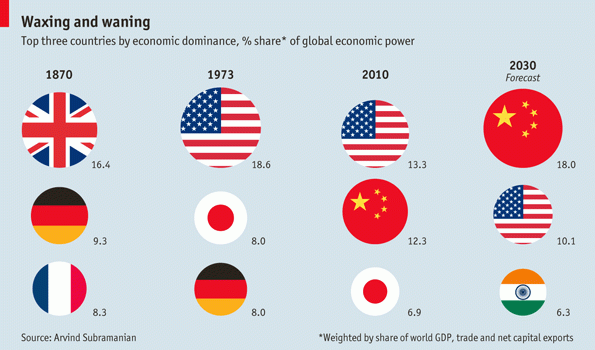
Economist talking up a new book by Arvind Subramanian, who often writes for the FT. It's called "Eclipse."
Why China looms large in the future global economy, according to Subramanian: demography, convergence, and "gravity."
Convergence is a take on the healing of the "great divergence" that began around 1800: West grows 1200% over two next centuries while the rest lost 50% (much due to colonialization). The "great convergence," as many call it, predicts that the West grows 600% this century while the rest grow 1200%. Doesn't eliminate difference, but closes gap mightily.
Demography, in Subramanian's take, is all about heft: China is 4X size of US so only needs 1/4 GDP per capita to outpace. He blows off the ageing issue, according to the Economist, and he doesn't seem to be tracking the decrease in labor either.
Subramanian is no pie-in-the-sky trajectionist, meaning those who place China on a neverending track of 8-10% growth. He buys into the S-curve argument and says China will grow about 5% for next two decades. That's the pattern we've seen in East Asia in the past (reach 25% of US per cap GDP and then slow to 5-6% growth).
The idea that caught my attention was the gravity one:
. . . the "gravity" model of trade, which assumes that commerce between countries depends on their economic weight and the distance between them. China's trade will outpace America's both because its own economy will expand faster and also because its neighbors will grow faster than those in America's backyard.
Point being: China works its region while we do not. We play the drug war and China is working infrastructure like crazy in SE Asia. China will also logically work toward an Asian Union with its economy as the centerpiece, while the US puts up a border wall.
Back to an argument I continue to make: we need to be opening up to the south like crazy, not shutting ourselves off on immigration and drugs. We'll make ourselves weak relative to China and India due to their bulk populations, when our version of their interior rural poor are there for the taking.
We should be expanding the United States, not closing it down.